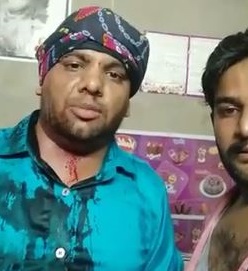
An Indian pastor was among those injured when about 50 Hindu extremists attacked a group of Christians holding a prayer meeting in one of their homes in Dabli Rathan, Rajasthan state, on 16 August.
From his hospital bed, pastor Harjot Sethi told Global Christian News that extremists belonging to two militant Hindu groups, the Rashtriya Swayamsevak Sangh (RSS) and Bajran Dal, entered the house and assaulted the 150 Christians who were there.
“While they were hitting me with wooden sticks, hands and fists, someone hit me on my head hard with a sharp object and blood started to drip from my head, down my neck and I fell down. On seeing the blood gushing out, the Hindu extremists got frightened and fled, leaving me in the pool of my own blood to die,” said Sethi.
The pastor had held two meetings at the same location before and never experienced problems, he said. The attackers “blamed us for alluring people with rupees – 50,000 each (about $780 US) – and converting them to Christianity. They ordered me to bow down before them and beg for forgiveness for doing such a crime. I politely refuted them by telling them that we have never allured people and forced them to believe in Christ. That very moment they started to beat me”, said Sethi. The mob also attacked his wife and beat her with wooden sticks.
When the police arrived, they took Sethi and his also injured 24-year-old assistant Rithik Arora to the police station. Upon arrival, they found the attackers sitting there already, having filed a complaint against Sethi and his team for “forceful conversion”.
The pastor said that, if the extremists had known about the meeting, “they could have informed the police before it took place – who could then have ordered us to stop the event. Instead they decided to attack”. He said that while the three were in the police station, “the police watched me bleeding profusely but did not arrest my attackers but interrogated me instead.”
A first account of the attack was posted by Sethi on YouTube.
Unlike several other Indian states, Rajasthan has never formally adopted an “Anti-conversion” bill. In this western state, the bill passed by the State Assembly in 2011 has not yet become an Act, as it was not signed by the Governor, nor did it receive federal presidential approval. (In India, bills passed by State Assemblies become ‘Acts’ only after receiving the president’s assent.)
However, the eastern Indian state of Jharkand recently introduced and passed a similar law: the National Council of Churches in India has now appealed to its Governor not to sign it into law.